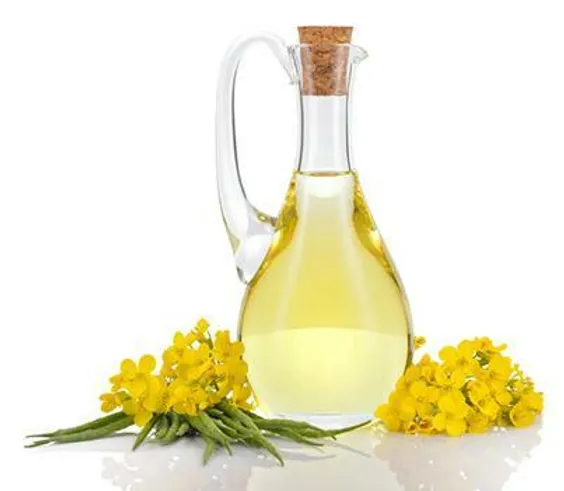
Beware of vegetable oils such as canola oil
We all consume canola oil and other similar vegetable oils. Confusion about the health value of vegetable oils exists that I would like to clear up for you. Our government tells us that these vegetable oils are good for us because they are polyunsaturated fatty acids (PUFA), and not saturated oils. They want us to believe that saturated fats are categorically bad for you. The problem with that is, the scientific literature says otherwise. Let me explain further.
How do we get vegetable oils? Vegetable oils are made from seeds such as rapeseed (canola oil) soybean (soybean oil), corn, sunflower, safflower, and others. Since the 1900s we have developed fairly complicated extraction processes to chemically remove these oils in which they also get deodorized, bleached, and refined—far from a ‘whole food,’ yet promoted as healthy by the American Heart Association. You’ll find these in almost all processed food.
Canola oil may have omega-3 fatty acids, to begin with, but high-heat processing denatures it, dramatically increasing the trans fat content. Watch this nearly 4-minute YouTube on how rapeseeds become canola oil: https://youtu.be/omjWmLG0EAs.
According to the American Heart Association, these are “common cooking oils that contain more of the better-for-you fats and less saturated fat”: Canola Corn Olive Peanut Safflower Soybean Sunflower
They advise replacing “bad fats (saturated and trans)…solid fats (butter, shortening, lard, and hard stick margarine) and tropical oils (palm and coconut oil), with healthier fats” such as vegetable oils! Therefore, it isn’t just trans fats found in cookies and processed baked goods that you need to avoid, it's vegetable oil too!
It’s no coincidence that obesity and heart disease rates have dramatically increased since Americans began eating vegetable oils instead of fats like butter.
Contrast these with coconut oil or even good old butter from cow’s milk, which only requires a simple separation. Yes, these fats do contain saturated fat, but saturated fat is not the disease-promoting culprit we were originally told it was decades ago. The science is pretty clear on this.
More recent studies show that vegetable oils may contribute to disease while saturated fat intake does not. Look at this science about saturated fat: A huge prospective meta-analysis reported in 2010 involving nearly 350,000 people found no association between saturated fat and heart disease. And, a Japanese study of 58,000 men followed for 14 years (on average) found no association between saturated fat intake and heart disease, and those who consumed more saturated fat had a lower stroke risk. While short-term studies show a relationship between saturated fat intake and blood cholesterol levels, nearly all long-term studies do not show this.
In contrast to saturated fat, vegetable oils are clearly associated with an increased risk of diseases like heart disease, cancer, diabetes and obesity Even many world governments have recognized this.
Furthermore, it’s no secret that vegetable oils also contain significant amounts of trans fats. Soybean and canola oils found on U.S. store shelves were found to have 0.56% to 4.2% of the fatty acids in them were toxic trans fats.
Vegetable oils like canola oil are high in Omega 6 (inflammatory) Previously I told you that omega 6 oils are pro-inflammatory, while omega 3s are anti-inflammatory. Omega 3 status (using the omega 3 index blood test) correlates nicely with heart health, increased insulin sensitivity, improved bone health, lower depression, and improved cognition and memory.
I also mentioned that the ratio of omega 6 to omega 3 is important because omega 3 is anti-inflammatory; the ideal is a 1:1 ratio or even more omega 3 than omega 6. Well, Canola oil is not only high in omega 6, but it is also higher in trans-fats some sources will tell you. Remember that trans fats are the “fake fat” fillers found in many foods that promote inflammation in your body, with the worse effect on your heart, and your brain, and have even been linked to cancer and obesity.
According to Dee McCaffrey, author of The Science of Skinny, “The deodorization process converts a large portion of the healthy omega-3 fats into very unhealthy trans fats.” Apparently, the Canadian government lists canola oil as having a trans fat content of only 0.2% percent, the University of Florida at Gainesville measured it as high as 4.6% in the commercial oil. He states, “The consumer has no clue about the presence of trans fatty acids in canola oil because they are not listed on the label.”
Interestingly, you probably didn’t know that canola oil was first used to make candles, soaps, lipsticks, lubricants, inks, biofuels, and insecticides. Then when scientists learned how to genetically modify rapeseed oil, they started turning it into an edible food product. Yes, it is low in saturated fat but has no acclaim to health.
To healthiest oil consumption for optimal health,
Michael Cutler, M.D.








